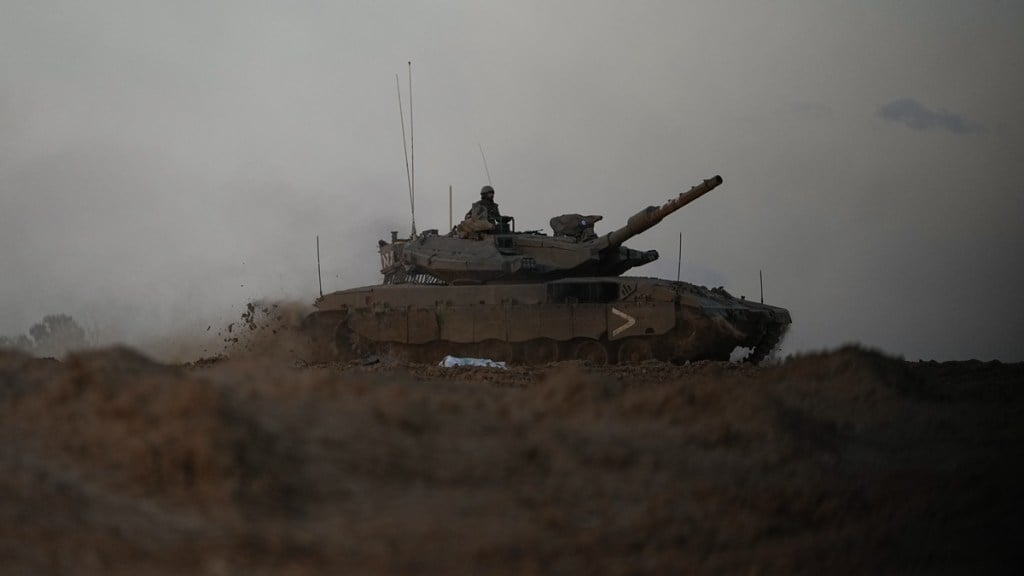Leaders from major emerging economies – Brazil, Russia, India, China and South Africa (BRICS) convened virtually to urge an end to the ongoing war between Israel and Gaza, underscoring a crucial need for a ceasefire to address the escalating humanitarian crisis in the Gaza Strip. This unique meeting, which traditionally focuses on economic matters, marked a significant departure by specifically addressing the situation in Gaza.
Chaired by South African President Cyril Ramaphosa, the BRICS group strongly condemned attacks on civilians in both Palestine and Israel, denouncing the forced displacement of Palestinians as “war crimes.” A comprehensive summary emphasized the group’s united stance against any form of forcible transfer or deportation, branding such actions as grave breaches of the Geneva Conventions and violations under International Humanitarian Law.
The BRICS collectively represent major emerging economies often recognized as leaders of the “Global South” in international policy. This gathering expanded its participation recently, including Egypt, Ethiopia, Argentina, Saudi Arabia, the UAE, and Iran as members from 2024. Today’s meeting also featured United Nations Secretary-General Antonio Guterres.
The chair’s summary underscored the growing consensus from the Global South to halt the conflict in the Gaza Strip. Originating from an October 7 attack by Hamas on Israeli communities, the conflict has led to extensive Israeli shelling of Gaza, violating international laws and resulting in the deaths of over 13,000 people, including many children.
President Ramaphosa opened the meeting with a strong condemnation of Israel’s actions, asserting they are in clear violation of international law, labeling the collective punishment of Palestinian civilians as a “war crime” and “tantamount to genocide.” He also held Hamas accountable for violating international law.
India’s External Affairs Minister, S Jaishankar, highlighted the need for restraint, immediate humanitarian support, and a peaceful resolution through dialogue. While condemning Hamas’ October 7 attacks, Jaishankar stressed the urgency of ensuring humanitarian aid reaches Gaza’s population, emphasizing the universal obligation to observe international humanitarian law.
Supporting Palestine, Jaishankar outlined India’s economic assistance, developmental projects, and financial support to the Palestinian Authority, expressing concern for the immense human suffering caused by the conflict. He reiterated India’s call for a peaceful resolution based on a two-state solution and peaceful coexistence.
Several BRICS member states, including Russia and Brazil, had previously criticized Israel’s continuous bombardment and ground invasion of Gaza. China hosted a delegation of Muslim countries seeking a ceasefire, further amplifying global efforts to de-escalate the conflict.
President Ebrahim Raisi of Iran proposed a referendum for Palestinians to determine their fate. South Africa, drawing parallels between its own struggle against apartheid and the Palestinian situation, has consistently advocated for a ceasefire. This sentiment was underscored by Parliament members voting to close the Israeli embassy in Pretoria, signifying a turning point in the country’s relationship with Israel.
Joining Bangladesh, Bolivia, Comoros, and Djibouti, South Africa submitted a referral to the International Criminal Court (ICC) to investigate potential war crimes in Gaza. Earlier this year, South Africa successfully persuaded Russia not to send President Vladimir Putin to the annual BRICS Summit due to an ICC arrest warrant related to war crimes in Ukraine.
Chinese President Xi Jinping, addressing the Israel-Hamas conflict, urged all parties to cease fighting and proposed an international conference for a lasting peace. He emphasized the safe passage of humanitarian assistance and ending collective punishment against Gaza’s people.
Xi’s push for peace followed a visit from a Saudi-led delegation of foreign ministers urging China to play a greater role in ending the conflict. A phone call with French President Emmanuel Macron reinforced the commitment to a two-state solution, and Xi called for an authoritative conference to restore Palestinian statehood.
Reports emerged of discussions between Israel and Hamas on a temporary pause in fighting to facilitate aid transport into Gaza and potentially swap captives. The ongoing conflict, triggered by Hamas’ October 7 attack, has resulted in significant casualties on both sides, with Hamas militants taking hostages and Israel responding with extensive military action.
The BRICS summit, attended by leaders from incoming members Saudi Arabia, Iran, Ethiopia, Egypt, Argentina, and the UAE, highlighted the global urgency for a peaceful resolution to the Israel-Hamas conflict. The collective voice from major emerging economies emphasized the need for immediate action to alleviate the humanitarian crisis in Gaza and establish a sustainable ceasefire.


